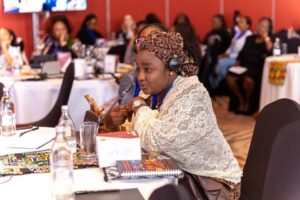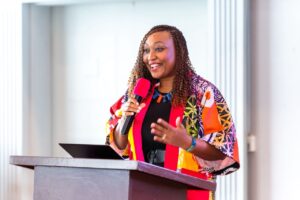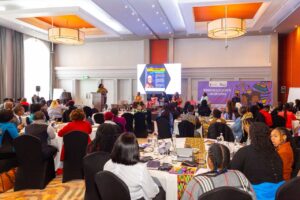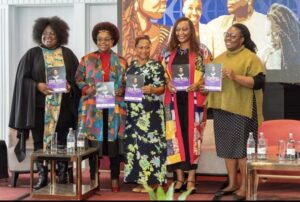“If women in law want to lead loudly, they must be seen, and heard.”
By Mariya Shuaibu Suleiman | Nigeria | July 24, 2025
Legal leaders, journalists, and stakeholders from more than 20 countries: Nigeria, Ghana, South Africa, Sierra Leone, Senegal, Botswana, Malawi, Gambia, the Democratic Republic of Congo, India, and the United States gathered in Nairobi, Kenya this past week, united by one goal: to ensure that women’s leadership in law is not only strengthened but also seen, sustained, and remembered.
Under the banner “Women Leading in Shaping Justice Across Generations,” the landmark convening brought together judges, lawyers, scholars, journalists, and policymakers to tackle an enduring challenge with fresh urgency: how to secure gender equality in justice and keep it firmly in the headlines.
“If It’s Not Reported, It’s Forgotten”
During a pivotal media Masterclass session moderated by Mildred Ngesa, a Pan-African Media and Communications Specialist, participants zeroed in on a glaring gap: the persistent underreporting of African women in legal leadership. While more women are rising to influential positions across the continent, many agreed that their stories often go untold, partly because there is too little data and too few accessible facts for journalists to work with.
It was this gap that set the stage for one of the gathering’s strongest calls to action.
Mariya Shuaibu Suleiman, a journalist with Premium Times Nigeria and the Founder and Executive Director of Voices Beyond Silence Initiative for Justice and Empowerment (VOBSI), urged women in the justice sector to see the media not as bystanders but as powerful allies.

“If legal experts don’t proactively engage the media, we risk becoming invisible. And when women are invisible, their victories fade, their battles are buried,” Suleiman said.
She emphasized the need for legal sector to partner with the media to ensure adequate visibility.
“We must make it a habit to open our doors to journalists and provide credible data and real-time statistics. The media cannot advocate for what they cannot verify. When we share facts, context, and figures, we empower the press to amplify our message responsibly and powerfully,” she added.
The convening spotlighted Kenya’s justice sector as a beacon of what progressive reform can look like.
Kenya’s Chief Justice Martha Koome, the first woman to lead the Supreme Court sent her keynote through Justice Njoki Ndung’u, celebrating the country’s milestones.
“Kenya’s story is one of exclusion, then inclusion; challenge, then transformation,” Koome noted, pointing to the sweeping gains made since the country’s 2010 constitutional reforms.
Today, Kenyan women hold: 42% of superior court judge positions, 78% of court registrar posts,
And 58% of magistrate seats.
Trailblazers like Justice Effie Owuor, Kenya’s first woman High Court judge, and Faith Odhiambo, the Law Society of Kenya’s second-ever female president, stand as proof of what’s possible when the doors open wider.
For Memory Kachambwa, the Executive Director of the African Women’s Development and Communication Network (FEMNET), the gathering was more than just a meeting, it was about amplifying women’s voices and building a lasting network.

“Part of our work is to amplify the voices of African women, especially those in leadership and law,” Kachambwa said.
“What inspired us was the idea of bringing together women working in law to intersect, to dialogue, to strategize, and come up with solutions for the barriers we face within the legal fraternity. This dialogue is about power, purpose, and persistence. It allows women to connect across generations and find collective strength,” she added.
The FEMNET approach, she said, is to create a space for collaboration, innovation, and solidarity, “a space not just for learning, but for leadership.”
The issue of mentorship was also raised, Justice Njoki Ndung’u explained the need to mentor young legal professionals, to her true progress means lifting up the next generation.
“Mentorship is not a handout, it’s a hand-off,” Justice Njoki Ndung’u told the audience. “Older women must see the younger ones not as threats, but as hope.”
Delegates from across Africa echoed that building bridges across generations is not optional, it’s survival.

Despite historic gains in representation, barriers remain, cultural bias, opaque promotion structures, and, crucially, a lack of consistent, informed coverage.
“Without the media, our victories stay locked in boardrooms and courtrooms, unseen by the public, unaccounted for by power structures,” Kachambwa reminded the audience.
This is where journalists like Sally Chiwama, a Journalist and Communications Expert, see an urgent gap and a solution.
“For me, I always insist that organizations need to partner with media organizations and invest in journalists,” Chiwama said. “How do you expect us to report your stories well if you don’t invest in us? Some organizations took time to train me, so when I write, nobody says I don’t know what I’m talking about because they invested in my understanding.”
She believes partnerships should begin from the concept stage. “Bring journalists on board early. Equip them with the knowledge they need, so they report from an informed point of view. It makes all the difference.”
Turning Talk into Action
By the dialogue’s close, delegates had drafted clear next steps: establish legal–media working groups to strengthen collaboration, train women lawyers and judges in media engagement and public speaking, develop open-access data dashboards to track women’s progress in legal leadership, and expand cross-border mentorship and leadership exchange programs.
A standout highlight was FEMNET’s unveiling of its Women in Leadership in Law Media Toolkit, an essential guide designed to help journalists and media practitioners boost the visibility of African women in law and justice, ensuring their contributions and feminist insights are heard loud and clear.

The toolkit was launched during a dynamic media masterclass, co-moderated by Purpose and the University of Johannesburg, alongside an insightful session on Media’s Role in Shaping Public Perceptions of Women in Law led by Pan-African media and communications specialist Mildred Ngesa.
As the Nairobi gathering ended with music and a renewed sense of mission, one truth rang louder than any closing speech: if Africa’s women in law want to lead, they must be seen, and heard.
“What we don’t document, we lose. What we don’t report, the next generation won’t remember,” Suleiman reminded her peers.
For Africa’s women in law, the case is settled: lead loudly, and make friends in the newsroom, not just the courtroom.


